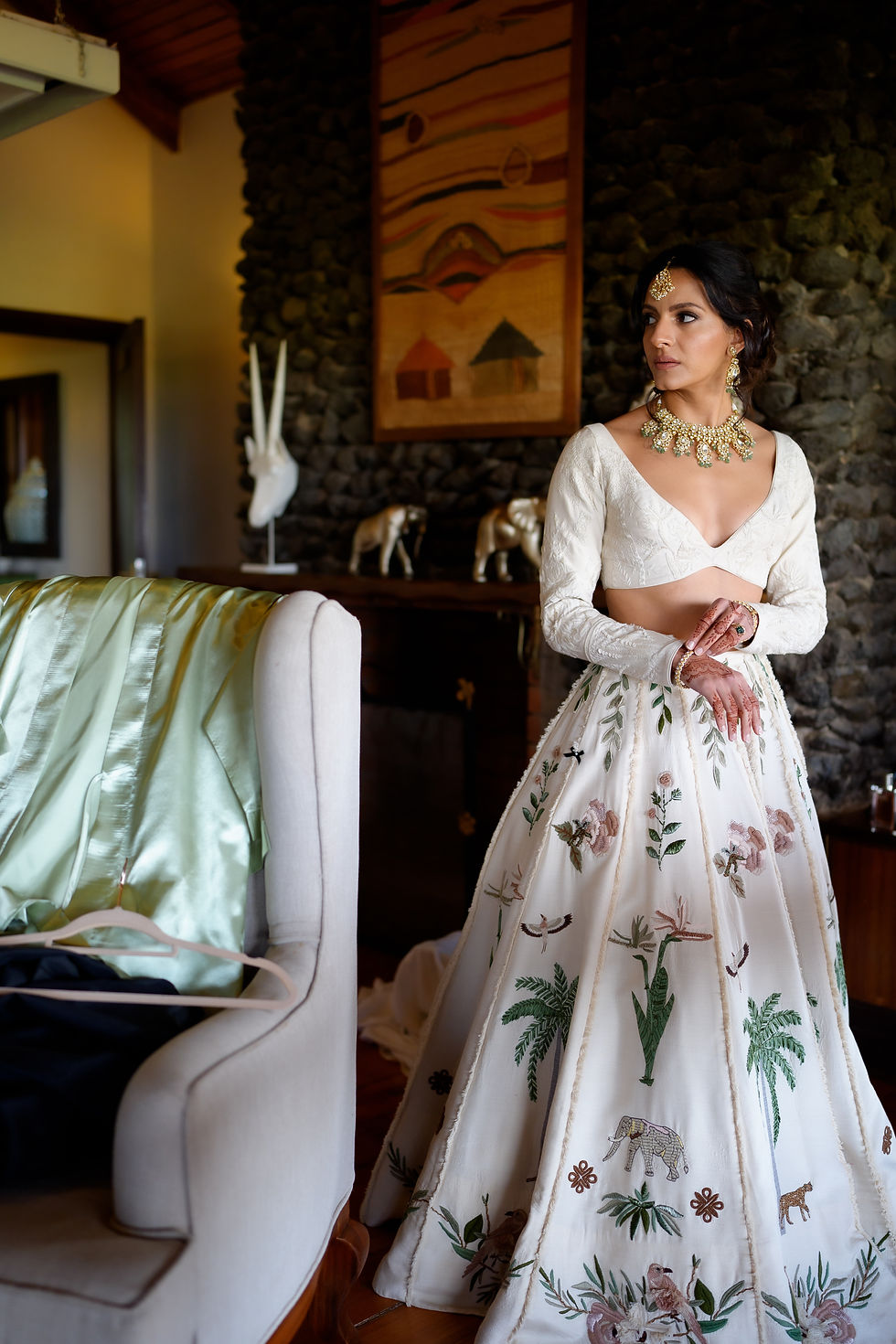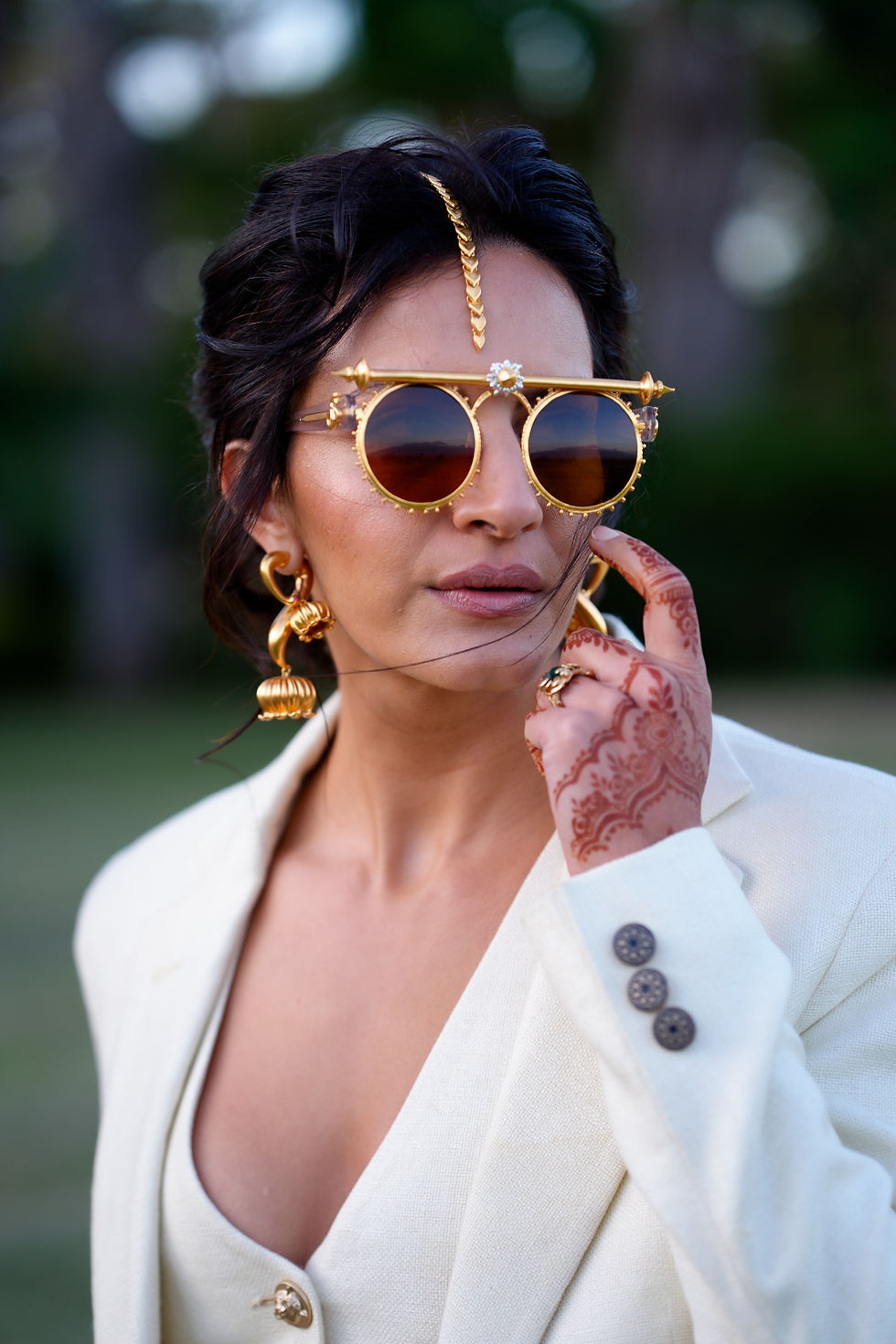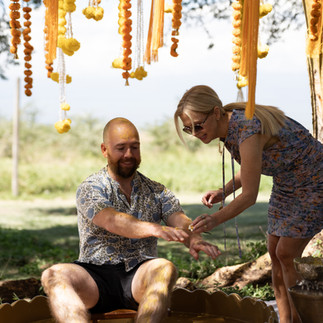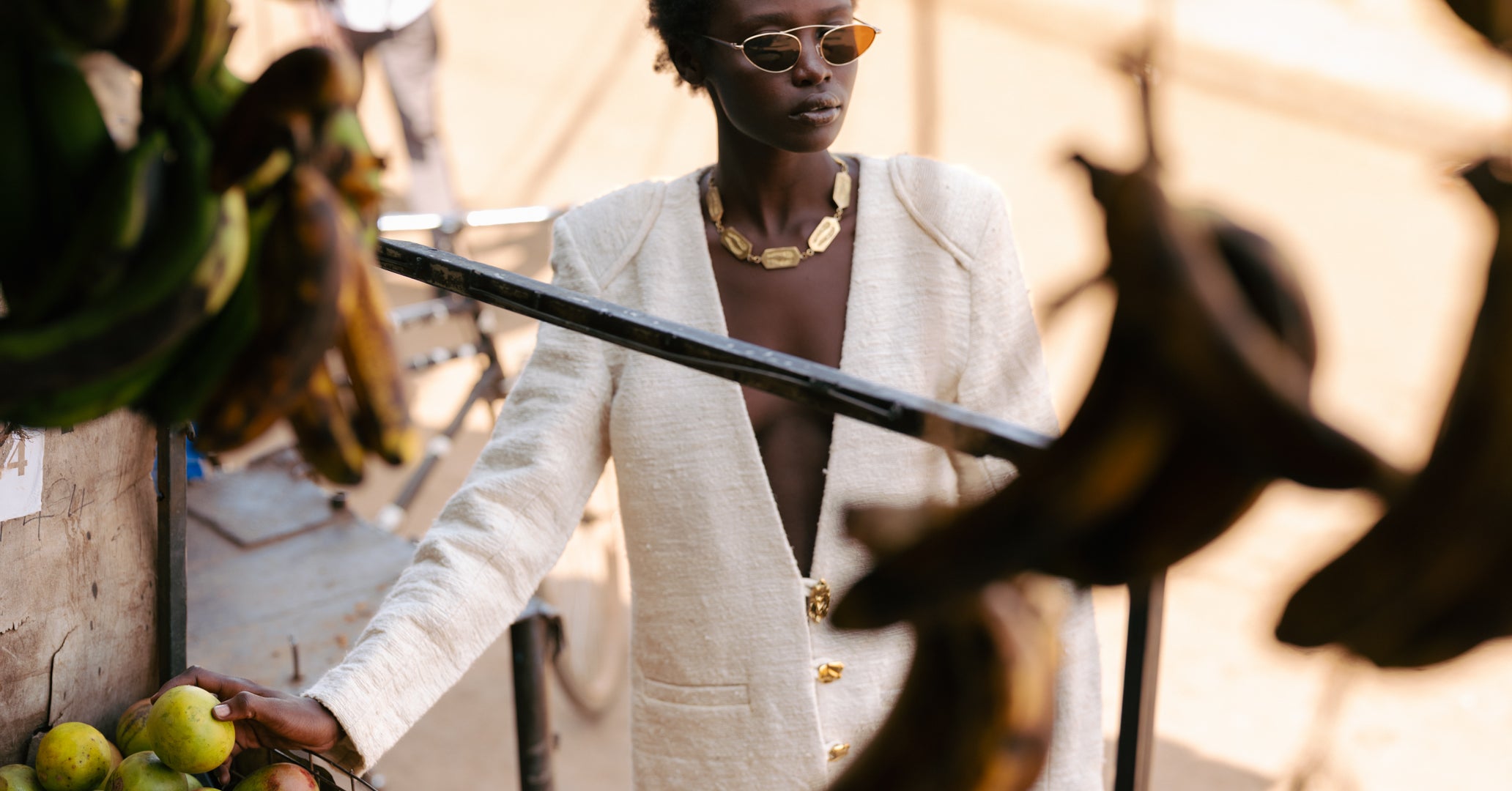Conscious Vows
- Sumana Mukherjee
- Nov 7, 2025
- 7 min read
Updated: Dec 22, 2025

When Ria began planning her wedding, she found herself standing at an intersection she knows well—the space between cultures, between tradition and innovation, between what exists and what could be. As the creative force behind Lilabare, a fashion brand that has become synonymous with conscious creation and cultural dialogue, she faced a challenge that would ultimately reshape not just her celebration, but her entire approach to design.

The wedding industry, with its endless rolls of polyester and disposable grandeur, felt fundamentally at odds with everything Ria had built her career upon. Here was an occasion that demanded beauty and meaning, yet the materials available seemed to offer neither longevity nor soul. So she did what any visionary would do—she reimagined the entire framework.
"I naturally gravitated towards working with drapery, which means the use of fabrics," Ria explains, her voice carrying the conviction of someone who has spent years thinking deeply about textiles. "I found that whatever was available from the wedding industry was not really a reflection of my philosophy and ethos on fabric."

Her husband, perhaps recognizing the inevitable, appointed her creative director without question. What emerged was a celebration that honoured the spirit of the occasion while creating something with purpose beyond a single day. The fabrics that adorned the mehendi, sangeet, the rehearsal dinner, and multiple days of celebration would go on to live new lives as the Diwali Edit, a collection that speaks to Ria's particular genius for making the meaningful wearable.

Born into a multicultural identity as a Swahili Kenyan woman of Indian heritage, Ria spent four years in Mumbai, a city she describes as the mothership of craft and textiles for Indian fashion. That experience, of arriving as a stranger and being taken in by relatives, of discovering the depths of Indian textile traditions while maintaining her own distinct perspective, shaped her understanding of fashion as a form of cultural conversation.
"I'm also a Swahili Kenyan woman. I just want to feel like I'm wearing a Dera all the time," she says, referencing the flowing East African garment that speaks to comfort and cultural identity. This desire to feel at home in her clothes while respecting multiple heritages, became the conceptual foundation for her bridal collection and the Diwali Edit that followed.

The challenge, as Ria discovered during her wedding planning journey, extends far beyond material preference. In Kenya, access to the best of Indian textiles and artisanship remains limited. In the United States, where her husband's family eagerly sought Indian clothing to participate in the celebrations, options proved equally scarce. Even in Canada, her friends and family found just one shop to cater to their needs.
"There's not much choice out here," Ria observes, "whereas in India you have the diversity and the access and also the perspective because you can see it all at once." But India's abundance presents its own complications. The market caters to vastly different customers—those seeking heirloom-quality pieces willing to pay premium prices, and those looking for affordable occasion wear they'll use once or twice. The latter often means polyester-heavy garments that prompt complaints from the diaspora about environmental concerns and discomfort.
Ria saw an opportunity in this gap. What if there could be garments that honoured Indian textile traditions but felt accessible to those not raised wearing them daily? What if the clothes could be lighter, less embellished, contemporary in silhouette but rich in cultural reference? The Diwali Edit answers these questions with pieces that are, in Ria's words, "their own version" of tradition—not copies, but interpretations that create new identity through thoughtful design. Each garment incorporates details from the wedding saris, including pallu sections that make every piece unique, carrying fragments of somebody else's story into new contexts.
But it's in her bridal wear that Ria's philosophy reaches its fullest expression. Working with dear friends Boo and Annora of The Little Black Bow, designer virtuosos she'd known since her Mumbai days, Ria created a lehenga that stands as both personal narrative and artistic statement. The collaboration required trust on both sides—Ria knew she would be far more involved than their usual bride, and they embraced her vision completely.

Every motif in her wedding lehenga tells a story: elephants representing both Ria's love for the animals and the Amboseli Park ecosystem where they married, on the border between Kenya and Tanzania. The location itself was chosen for its resonance—Ria's husband first came to Africa through Tanzania's Peace Corps, spending two years in a remote village before eventually making his way to Kenya and to her.
The lilac-breasted roller, Kenya's national bird. The sacred ibis, another favorite. Doum palms indigenous to Amboseli, standing stark and beautiful against the spectacular backdrop of ice-capped Kilimanjaro. Proportions and colours were carefully balanced by the genius of The Little Black Bow combined with Ria's natural gravitation toward Earthy, unsaturated tones.

This sense of aesthetics made a natural progression to Lilabare’s Diwali Edit. The embroidery handcrafted in jute and silk threads, represents a feat of artisanship that reflects Ria's commitment to natural materials and traditional techniques. The base fabric is Tussar Silk which ranks among her favourite textiles. The entire process felt, she says, spiritual—taking her back to her first art form, painting, which she practiced before she could walk and which always carried layers of symbolism beyond surface beauty.
"Nothing is done just because it looks good," Ria insists. "Yes, we put things together, but there's a deeper meaning behind each piece."
This commitment to meaning extends to her ongoing innovations in technique. The mehendi motifs that have become a signature element of Lilabare's design language originated with her mother's wedding several years ago. Her mother, who dislikes how mehendi looks on her hands, still wanted to embody bridal tradition. Ria's solution was to create mehendi motifs in gold thread embroidery, applied to a contemporary take on the conventional one-shoulder sari drape.
From there, she digitally designed additional mehendi patterns, rendering them on 3D platforms to see how they would sit and move. But screen printing felt too flat, too uniform. Block printing offered the precision and modularity she sought, but Kenya has no tradition of hand-carved blocks, no artisans practicing this specifically Indian craft.
Ria's solution demonstrates the technological inventiveness that runs through all her work. She had the designs laser-engraved onto wooden blocks and then refined them with hand carving. The result is a series of eleven blocks, fabricated through a technology-oriented but green process, that debuted in Lilabare’s Spring Summer ’24 collection at Lagos Fashion Week.
"It was important to me to show on that runway," Ria says of Lagos Fashion Week, where she introduced herself with the full multiplicity of her identities and aesthetics. The block prints have since become part of Lilabare's permanent design language, applied in evolving ways across collections.
This approach of creating systems rather than just products, reflects Ria's larger critique of the fashion industry. The traditional manufacturing model, with its outsourcing and mass production, represents what she calls "the lazy way" and an outdated system.
"Fossil fuels are a finite resource," she points out with the calm certainty of someone stating the obvious. "I am no predictor in macroeconomics or trends or when that is going to happen, but it is inevitable." She's already building the alternative that empowers makers, where garments carry integrity and power, where clothes are good for the people wearing them rather than wrapping them in devalued plastic.
"My calling in life or what I feel as my purpose is to innovate and shape and contribute to the way we make and wear clothes," Ria says.

This philosophy extends to her sourcing practices. Beyond the wedding saris, Ria actively seeks out and collects pieces from Indian Kenyan women—women who embarked on steamboats from Kerala, Gujarat, Mumbai, and Delhi, who settled in Kenya and brought their saris with them. These textiles carry historical value with stories of migration and adaptation that mirror Ria's own experience of embracing diversity.
She has become known in the community now. Women approach her with saris they want transformed, pieces they can't bear to give away but unsure how to honour. Ria loves this work, currently undertaking a similar project with her own mother, reimagining saris passed down from her grandmother into pieces the next generation can wear and cherish.
Ria also ensured the Diwali Edit featured Lilabare's signature brass work and handcrafted beads from Nigeria, Ghana, Ethiopia, and Kenya—a deliberate nod to the pan-African aesthetic that defines her brand. This is an authentic expression of her reality, of living in the multiplicity of identities and influences that define contemporary African life.

For Ria, celebrating Diwali has always meant something special. Growing up, her family treated it as the most important holiday of the year—more significant than any other celebration. "I really wanted to bring together all the elements of my identity," Ria explains. "Even celebrating Diwali for me is a different experience than someone in Mumbai or Rajasthan or the US."
Ria’s way of living requires curiosity and a willingness to seek out the makers and artisans who exist in every community, often overlooked. "Craftspeople are everywhere," Ria insists. "Artisans exist, they will exist no matter what. People craft with their hands. It's a primal instinct."
The fashion industry doesn't need more people following the established system with visible lines of fatigue. It needs creators willing to build new systems rooted in their own ecosystems, life experiences, and cultures. It needs designers who understand that integrity in fashion starts with integrity in making—with knowing where fabric comes from, who made it, what it costs in human and environmental terms.

For Ria, the answer lies in creating clothes that feel like home regardless of where you're standing—that let a Swahili Kenyan woman of Indian heritage feel equally comfortable in Nairobi, Mumbai, or anywhere else. Clothes that let someone with no Indian heritage participate in Diwali celebrations without appropriating, that let second-generation immigrants connect with ancestral traditions through contemporary forms.
"I hope it finds lots of good wardrobes of people who really want to feel like they're comfortable, that they're tapped into the traditions of Indian heritage and culture and craft, and also something that's more contemporary and hybrid for every day," Ria says.
Standing in that middle space, creating from that place of beautiful complexity, Ria Ana Sejpal-Sullivan is showing us what fashion can be when it starts from a place of meaning rather than blindly following trends.

The Diwali Edit is now available as a limited collection on lilabare.com
Support our work on documenting Indian textile heritage—Buy our previous editions!








































Comments